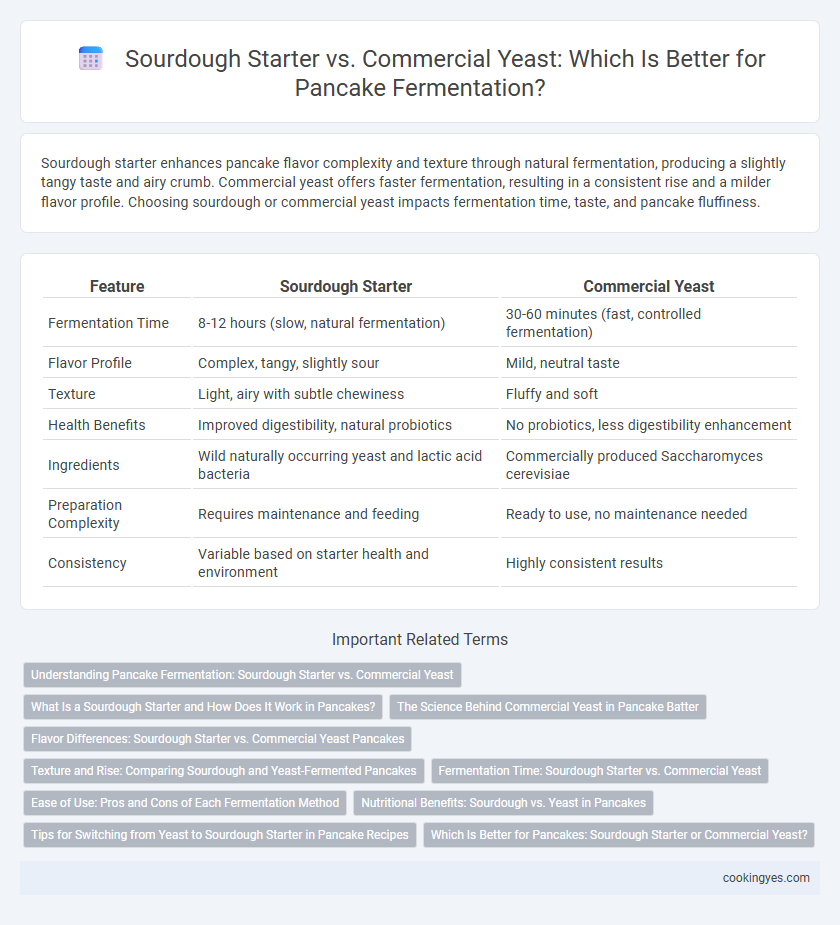Sourdough starter enhances pancake flavor complexity and texture through natural fermentation, producing a slightly tangy taste and airy crumb. Commercial yeast offers faster fermentation, resulting in a consistent rise and a milder flavor profile. Choosing sourdough or commercial yeast impacts fermentation time, taste, and pancake fluffiness.
Table of Comparison
| Feature | Sourdough Starter | Commercial Yeast |
|---|---|---|
| Fermentation Time | 8-12 hours (slow, natural fermentation) | 30-60 minutes (fast, controlled fermentation) |
| Flavor Profile | Complex, tangy, slightly sour | Mild, neutral taste |
| Texture | Light, airy with subtle chewiness | Fluffy and soft |
| Health Benefits | Improved digestibility, natural probiotics | No probiotics, less digestibility enhancement |
| Ingredients | Wild naturally occurring yeast and lactic acid bacteria | Commercially produced Saccharomyces cerevisiae |
| Preparation Complexity | Requires maintenance and feeding | Ready to use, no maintenance needed |
| Consistency | Variable based on starter health and environment | Highly consistent results |
Understanding Pancake Fermentation: Sourdough Starter vs. Commercial Yeast
Sourdough starter fermentation in pancakes yields a complex flavor profile with natural tanginess due to lactic acid bacteria, while commercial yeast offers faster, more predictable leavening with a milder taste. The fermentation time for sourdough is significantly longer, often requiring 8-12 hours, contributing to a chewier texture and enhanced nutritional benefits through natural enzymes. Commercial yeast, specifically Saccharomyces cerevisiae, accelerates carbon dioxide production, resulting in lighter pancakes but less depth in flavor complexity.
What Is a Sourdough Starter and How Does It Work in Pancakes?
A sourdough starter is a natural leavening agent made from fermented flour and water, containing wild yeast and beneficial bacteria that produce carbon dioxide and lactic acid during pancake fermentation. This natural fermentation process enhances pancake texture, flavor, and digestibility by creating complex, tangy flavors and a tender crumb compared to commercial yeast. Unlike commercial yeast, which offers rapid and predictable rise due to a single strain of yeast, sourdough starter requires longer fermentation time but results in pancakes with deeper flavor profiles and improved nutritional qualities.
The Science Behind Commercial Yeast in Pancake Batter
Commercial yeast in pancake batter accelerates fermentation by rapidly converting sugars into carbon dioxide and alcohol, creating a consistent rise and light texture. Unlike sourdough starter, which relies on wild yeast and lactic acid bacteria, commercial yeast produces gas more predictably, resulting in uniform bubbles and a tender crumb. The controlled enzymatic activity in commercial yeast optimizes the breakdown of starches and proteins, enhancing batter aeration and overall pancake fluffiness.
Flavor Differences: Sourdough Starter vs. Commercial Yeast Pancakes
Sourdough starter pancakes develop a complex, tangy flavor profile due to natural wild yeast and lactic acid bacteria fermentation, enhancing depth and subtle sour notes. Commercial yeast pancakes ferment faster, resulting in a milder, sweeter taste with less acidity, emphasizing the buttery and sweet flavors. The prolonged fermentation of sourdough also improves texture, creating a light, airy pancake with a nuanced savory-sour balance distinct from the more straightforward flavor of commercial yeast pancakes.
Texture and Rise: Comparing Sourdough and Yeast-Fermented Pancakes
Sourdough starter produces pancakes with a complex, tangy flavor and a slightly denser texture due to its natural fermentation process, enhancing crumb structure and moisture retention. Commercial yeast promotes rapid carbon dioxide production, resulting in lighter, fluffier pancakes with a more consistent rise and a tender crumb. The choice between sourdough and commercial yeast impacts both the pancake's aeration and mouthfeel, balancing traditional flavor depth with rise efficiency.
Fermentation Time: Sourdough Starter vs. Commercial Yeast
Sourdough starter requires a longer fermentation time, typically ranging from 8 to 24 hours, allowing natural wild yeast and lactic acid bacteria to develop complex flavors in pancakes. Commercial yeast ferments dough much faster, usually within 1 to 2 hours, producing a lighter texture but less nuanced taste. The extended fermentation with sourdough contributes to enhanced digestibility and a tangy flavor profile that commercial yeast cannot replicate.
Ease of Use: Pros and Cons of Each Fermentation Method
Sourdough starter requires more time and attention to maintain, making it less convenient for quick pancake preparation but adds complex flavors through natural fermentation. Commercial yeast offers rapid fermentation and predictability, ideal for effortless and fast pancake batters with consistent rise. While sourdough can enhance texture and depth, commercial yeast streamlines the process, appealing to users seeking simplicity and speed.
Nutritional Benefits: Sourdough vs. Yeast in Pancakes
Sourdough starter fermentation enriches pancakes with beneficial probiotics, enhancing gut health and improving nutrient absorption compared to commercial yeast. The natural fermentation process in sourdough breaks down phytic acid, increasing the bioavailability of minerals like iron, zinc, and magnesium. Commercial yeast, while effective for leavening, lacks these nutritional benefits and does not contribute to the development of complex flavors or improved digestibility.
Tips for Switching from Yeast to Sourdough Starter in Pancake Recipes
When switching from commercial yeast to sourdough starter in pancake recipes, adjust fermentation times to allow for the slower, natural leavening process, typically extending resting periods to 8-12 hours. Use a 100% hydration sourdough starter to maintain consistent batter texture and flavor development, and reduce added sugar or sweeteners, as sourdough fermentation enhances natural sweetness. Monitor batter consistency closely, as sourdough starters yield more acidity and tang, balancing flavors with slightly increased baking soda to improve rise and tenderness.
Which Is Better for Pancakes: Sourdough Starter or Commercial Yeast?
Sourdough starter enhances pancake flavor with natural fermentation, creating a complex tangy profile and improved digestibility compared to commercial yeast. Commercial yeast offers faster fermentation, producing fluffy pancakes with consistent rise and texture ideal for quick preparation. Choosing between sourdough and commercial yeast depends on desired taste complexity and preparation time preferences.
Sourdough starter vs commercial yeast for pancake fermentation Infographic

 cookingyes.com
cookingyes.com